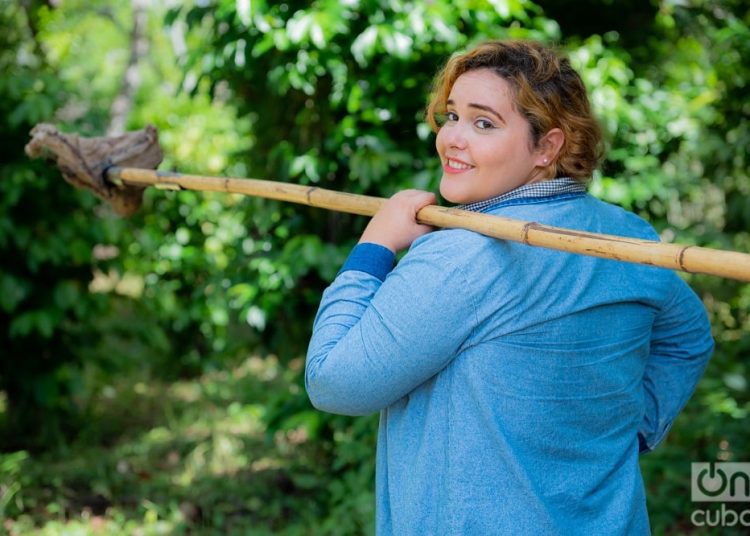Before her father died, he asked her not to leave her mother alone. But his last words were: “Valentina, don’t sell Panchón.” By then, she had been assuming the tasks of “the man of the house” for more than ten years: driving, carrying water, fixing electrical problems, taking care of the animals, cutting grass, soldering an iron, making a hole…. She knew that, somehow, her father had been preparing her for this moment.
“Don’t worry, go where you have to go, even if I have to beg with a can, I’m not selling that car,” she reassured him.
The promise of being an artist she made to her sister Givenchy of hers. They say that she was a very happy person, very cheerful, very much in love. She loved watching Valentina sing and they had a great connection, even though Valentina was more than twenty years her junior.
If one of them cried, the other cried too; if one was happy, the other was too. “I’m sure that, if she could walk, she would have been an artist, dancer, singer, actress…,” says Valentina.
A bad polio candy had caused her older sister a prolonged coma and cerebral palsy that left her bedridden since she was a year and a half old, and for her entire life. Her mother, only 16 years old, traumatized by the situation, decided to have another baby shortly after following the advice of a psychologist.
This is how Jianny arrived, María Elena’s second child, with a man who abandoned the family shortly after it was confirmed that her daughter would never recover. But life takes and gives: Omar appeared, El Guajiro, a teacher from the Ceiba 4 school in the countryside who fell in love with that woman and his two children who, forever, would also be his.
Thanks to Omar, they moved to the San José farm, based on the well-being of Givenchy and, after a few years, Omaris Valentina was born when her mother was 40 years old and her father was 43.
Since she was a child, she witnessed the love between the two, her mother’s immense dedication to the care of her sick sister. When Givenchy was 14 years old, the doctors said that she would die if they did not perform a colostomy, as the curved spine had affected her organs and her digestive system was not working properly.
Omaris proudly recounts how her mother told the doctors: “I’m not going to have my daughter cut,” and every four days she performed a manual feces extraction procedure. Givenchy lived 38 years.
“My mom kept her alive, also thanks to Public Health, which provided us with all the resources at that time. We had everything here. The room in this house was an ER, as people say…,” Valentina recalls.
She was 12 years old when her sister died. They were both lying on the bed. She ebbed away next to Valentina, little by little.
“Imagine, the curiosity of a 12-year-old girl. I was touching and feeling how the body was getting cold and rigid. I was in the whole process because my mom couldn’t.”
She tells it while she shows me the photos of her sister and smiles, with a sweetness that doesn’t match the terribleness of the story. Omaris Valentina is like that, incredibly cheerful and generous.
“Those things harden you for life, make you stronger and make you value the people you have next to you.” She knows that her family has given her everything, because, in many ways, she is what Givenchy could not be.
To show me how happy her sister was, she tells me that she always wanted to get married. Her mother did the makeup for the brides and made the floral arrangements and her father took them in the car to go around El Rancho, a nearby town. There’s a large statue of Antonio Maceo there and it is a tradition that the brides place their bouquet there.
Givenchy grew up watching weddings and the rituals that went with them. “Imagine, a girl in that state, how was she going to get married? But my mom dressed my brother in a suit and got them married.” She put on a wedding dress and took the bouquet to the Maceo statue, there was cake and whistle blowing throughout the town.
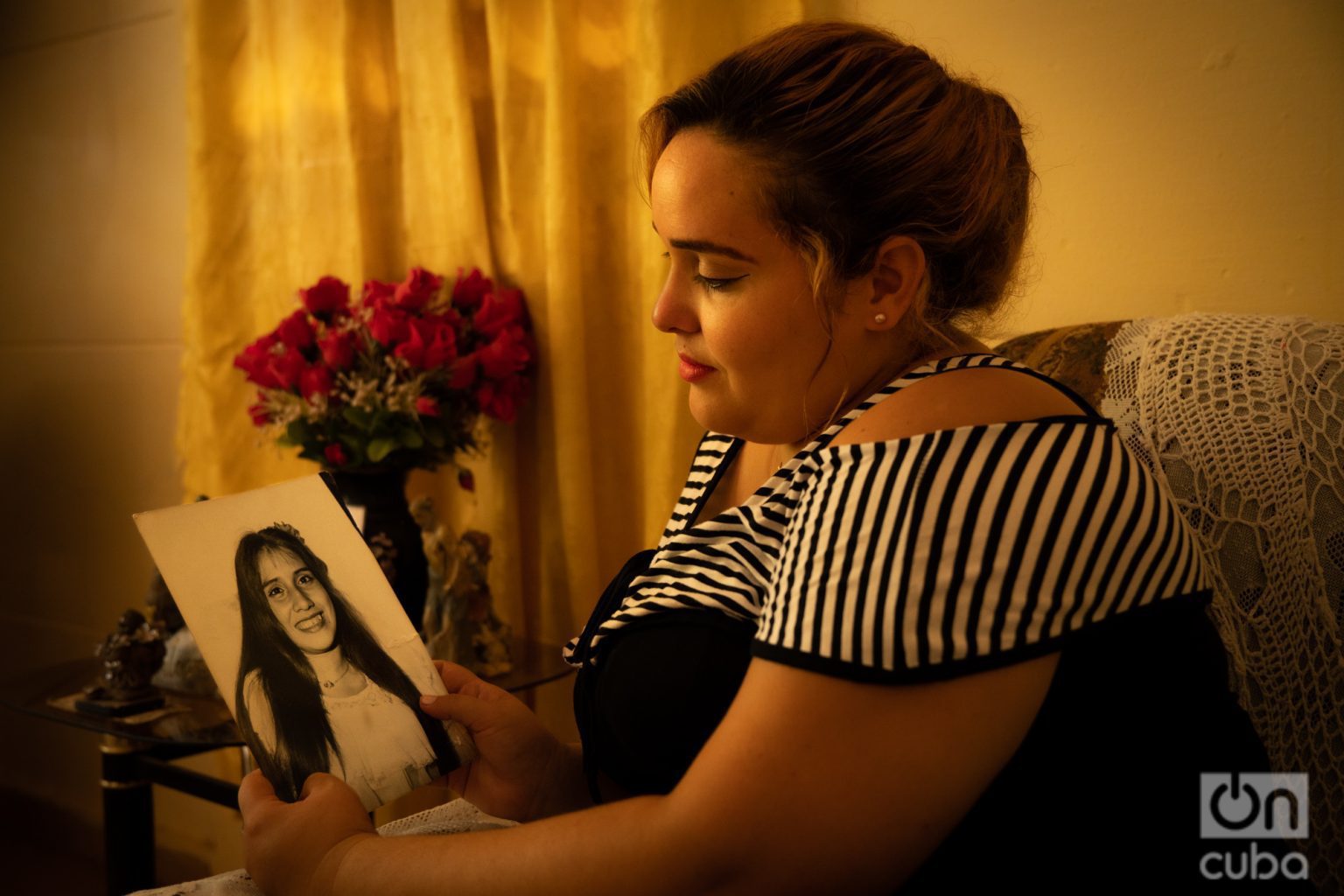
Omaris Valentina Mirabal Requejo, 26 years old, born and raised in Ceiba del Agua, Artemisa, 5 kilometers from the town center, did not come from artist parents; but fame is in her blood. Her mother, María Elena, was the waitress at the small Coppelia ice cream parlor in Pueblo Nuevo. She worked for fifteen years there, with her girl in her wheelchair next to her thanks to the fact that Social Welfare allowed her to.
For a while that was the only place that sold something to eat in the area. There was a huge poverty, for children who today are men and women, María Elena eased their hunger by giving them bread, soft drinks, and ice cream. When they go out together, people greet her mom more than her, who is on national television every week.
Her mother’s reputation in the town is only matched by her father’s. Valentina is used to strangers approaching her and asking her: “Isn’t that Huevo Frito’s car?” The neighbors called her father El Guajiro and the students at the school where he taught for many years called him Omar El Calvo and Huevo Frito, because her mother brought him bread with fried eggs for lunch.
El Wacho’s car, as some also nicknamed him, is unmistakable and when they see it go by everyone wants to say hello to their teacher’s daughter, the man who made their lives easier. “My dad was a thinking brain. Every time a farmer had a problem, he would come here and he would solve it for him.”
Omaris feels happy because the years have passed and nobody forgets her mother and her father.
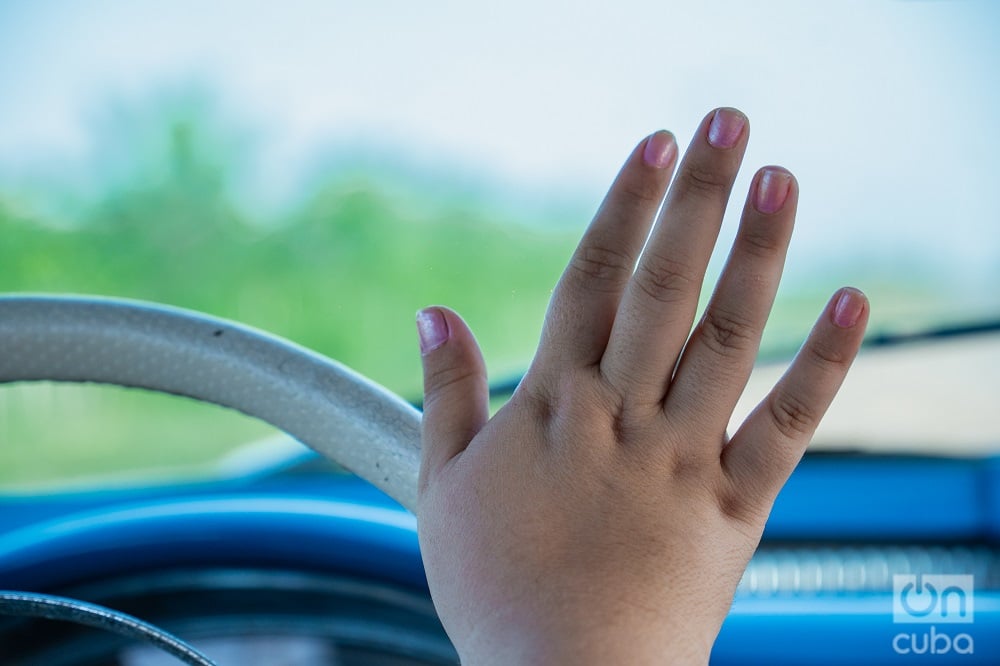
Omaris Valentina seems to have come into the world to keep promises and pay off debts. Her paternal grandmother did not approve of her parents’ love. She couldn’t understand how her son, a university graduate, a teacher, was going to be with a divorced woman, with two children and, to top it off, an invalid.
Her father lived through a constant war until she was born, with two teeth like her grandmother was born. “He appeared at the hospital with a little painting that they had made for him years ago, with a gold frame and everything, so that my mother could see that I was her granddaughter.”
Valentina was always very attached to her father and, therefore, attached to Panchón. He said that when her feet reached the pedals he was going to teach her how to drive. The excited girl came every day from school and sat in the car; but her little feet dangled.
One day she arrived from junior high school and touched the accelerator with her feet. Her father took her to the orange loading area of the old Cítrico Ceiba enterprise and taught her go back and forward. The second day, she returned home driving. She was 13 years old and she did not suspect that having the wheel in her hands would be her destiny.
Within a few months, her father lost half of his vision due to diabetes. He could never drive again. Valentina, the daughter of old people, began driving clandestinely at the age of 13 throughout the town. She went as far as the 100 bridge and did not go into the city so as not to be discovered.
“Thanks to the fact that he taught me to drive, I have been able to have a career and solve all the problems at home. Because everything is far away: the grocery store, the polyclinic, the shops… everything,” she says with accumulated relief.
When her father got sick, she took care of everyone. At that moment she knew how difficult it was to run a home and all the sacrifices he had made for his family. In this way, she was able to extend the life of her father by about ten years, after the doctors said that his heart could not take it anymore.
When she had to take charge of the house, she appreciated her father’s orders more than ever: “Valentina, you have to learn to be a mechanic!”
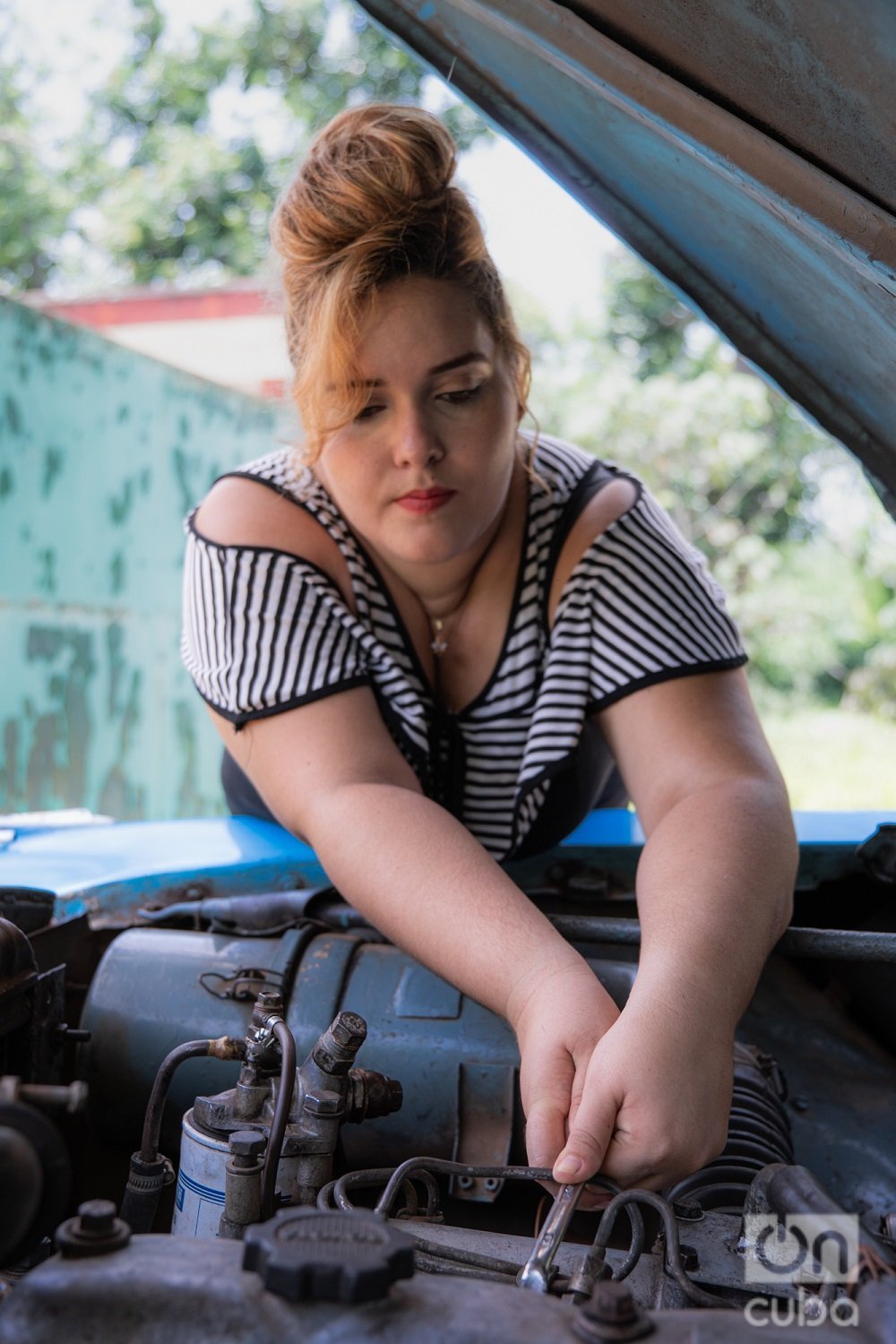
She knows how to fix a flat tire, cancel a brake line, she knows everything a driver needs to know. But caring for Panchón is not easy. It is a car with all its original parts that her grandfather bought more than fifty years ago for 5,000 Cuban pesos. Today it costs a fortune to keep it in good condition.
His father, from the age of 21 until his death at 68, dedicated himself to maintaining it as a jewel and adapted the engine to oil himself. After he died, every time it breaks, no one steps forward to fix Panchón, because many internal mechanisms of the car were designed by Omar, only her uncle Felito knows how to fix it.
When she is alone, she desperately invokes her father: “If you are there, come help me with this. Please, come down, come to me spirit of light, we are in need here.” Omaris laughs out loud when she recites the prayer for me, and she tells me that what she has done for Panchón she doesn’t do for anyone.
She loves animals. She adores dogs and on her farm, they have had up to fifteen at the same time; among them, a Doberman who lived 18 years. They have always had pigs and that is one of the great sentimental dilemmas of her life.
Right now they have two sows and two little pigs that eat grass, avocado and mango. One was to eat it and the other to get the money and the car’s bodywork. They have had to sell them, but they have not been able to: every time she’s had an opportunity to complete the deal, Valentina begins to cry inconsolably.
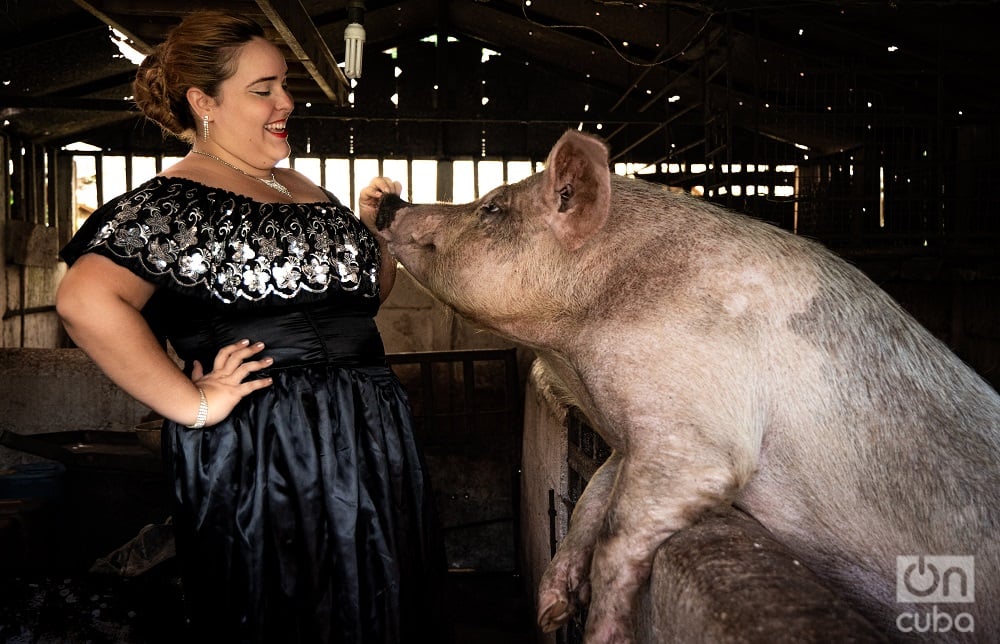
The pigs have lost weight because there isn’t much food to feed them, but Valentina doesn’t want to kill them. She never forgets the time she had to sell the mother of the sows, in the middle of the pandemic, to buy two tires for her car.
“I went crying behind the cart that was taking away the pig, I weighed the sow crying and I was crying for a whole week.” She only does that for Panchón, because that sow was historic and she was also the mother of Bebé, a semi-invalid little pig that grew up inside the house. Thanks to a lot of care, it managed to recover the strength of its hind legs and walked well. When it was about 200 pounds it started limping again because of the weight.
One December when there was nothing to eat, her parents took advantage that Valentina was in Havana and killed Bebé. At that time she also spent days crying and reproaching them, but after fifteen days she was so hungry that she had to eat her dear pig.
“When you have to sell a pig or eat it, that is horrible. For me, it is the latter. I prefer to eat just rice than kill one of those pigs.”
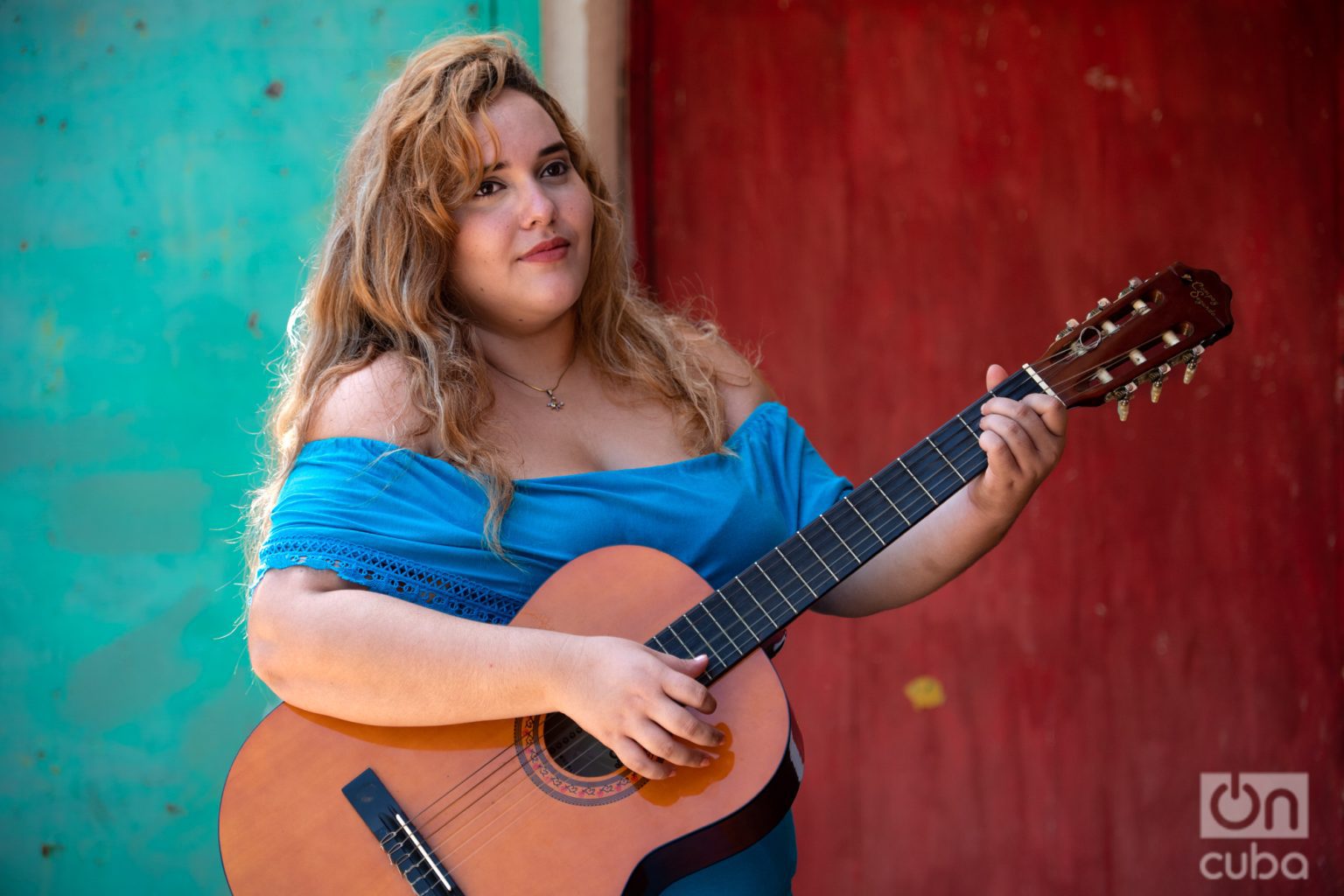
When she was 7 years old she danced in the morning meetings at school and in all the activities. But in high school, she stopped doing it.
“I was no longer the pretty chubby girl who danced well; they used to say: ‘What is that fat woman doing dancing?’” That has marked her to this day.
One day at a pioneer festival, Ernesto Tejera, the boy who, in the past, brought the croquettes to the bar when her mother worked at the small Coppelia ice cream parlor and who, at that time, was an art instructor specializing in music, saw her dancing. He went to see his old co-worker and told her: “Buy the girl a guitar, that, with what she dances…if she sang, we have a complete show.”
Everyone was excited about the proposal, but they had no money. They waited a whole year and sold a crop of avocados to buy the guitar. Omaris Valentina spent five years taking classes with the croquettes boy, her first music teacher.
With him, she learned to play the guitar on the right while being left-handed and to sing Mexican folk songs. Her mother made her the best mariachi outfit out of recycled clothing. “I keep it to this day as a treasure. The first time I stood on stage as a singer was with it on.”
Since she was 12 years old, she has been singing Mexican folk songs. She learned all the songs from “La hija del Mariachi” to please Givenchy, who was in love with Francisco Lara, the leading man in that soap opera.
Omaris toured the entire town dressed as a mariachi until a friend of hers told her mother that she should find a better path within music because if not, she was going to stay singing those songs for the rest of her life.
She went to see Juan Espinosa, one of the most important pianists in Cuba, who has accompanied great musical figures such as Rosita Fornés and who has involved many young people in the world of opera.
I had the nerve to sing a Mexican folk song for that man with his record. Espinosa was able to catch a glimpse of her good voice and recommended her to an opera singing teacher; although she yelled: “Scrap, scrap!” referring to the song that Valentina had just sung to her with all the intensity that a mariachi carries in her voice.
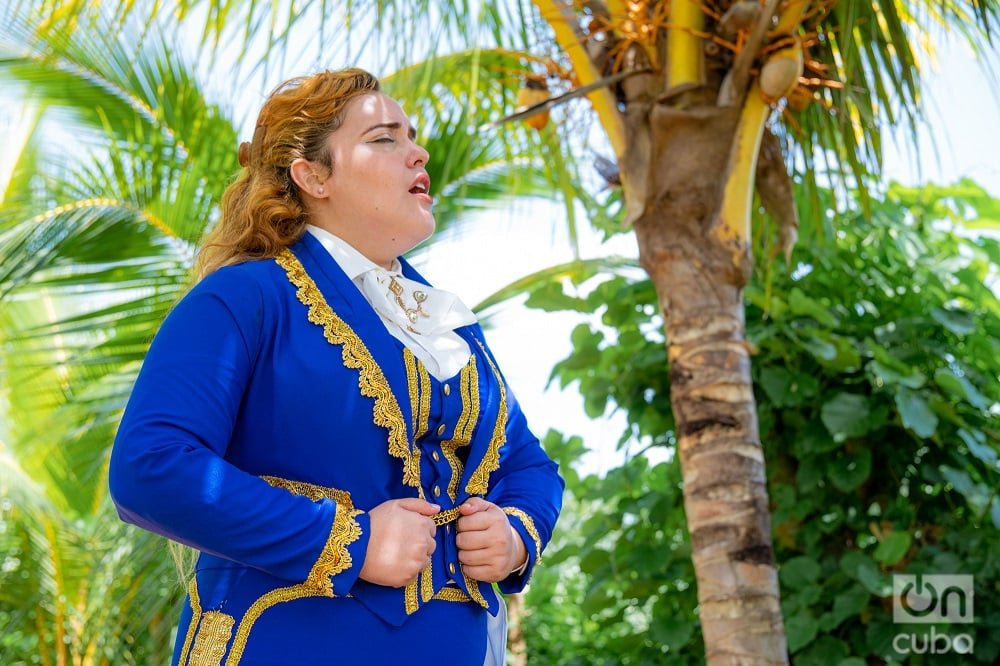
For six years, every Saturday she covered the 53 kilometers that separate her farm in Ceiba del Agua from El Vedado, to go to Marta Cardona Hernández’s house to receive singing classes. She would go out in the car driving, picked up her brother in El Guayabal and they would exchange Panchón’s wheel to make the trip to Havana.
Her brother doesn’t sing because he doesn’t have her talent, but went to all the classes with her, as her companion and her protector. When it came time for her to take the ISA tests, she failed for reasons unrelated to her musical talents.
She became depressed and very sad until her teacher told her that she could take the Opera Theater aptitude tests. After a close competition, Valentina approved with number 13 of the 20 that they selected that year.
Today she is a graduate of Intermediate Level Opera Singing and also a high school graduate in Ceiba because her father always told her: “You bring me a high school degree and then dance and sing and everything you want.”
Among the good things Omaris has is being grateful. She, an opera singer who appears on television and is studying at the University of the Arts, remembers how many people helped her to get to where she is.
She thanks Marta Lidia Rodríguez Pita, the art instructor who gave her dance classes and the first person who helped her see herself as an artist. To her first teacher, the Mexican folk song one. To Rey Reyes, and his mother Odalis, who works in the Ceiba polyclinic and was a friend of her mother and guided her to place her in opera singing. She is immensely grateful to Roberto Chorens, the director of the Opera Theater, who began by telling her: “I’m going to see, you are so fat, what are you going to do…” and ended up nicknaming her “the deep one” for how she interpreted the Romance of the farewell, by Fernando Mulens.
“I won him over with that song; although the other students had an elementary level of music and I came from a high school and singing Mexican folk songs.”

During her stay at the Opera Theater, she met Maité Galván, with whom she had a special connection and helped her a lot during the four years of school. From the moment she saw her, she told her: “You will be here singing, but you are an actress.” Later another teacher, Yuniel Hernández, told her the same thing and, as in the days of the Mexican folk songs in her town, he sent her with someone to “see her.” And another teacher came into her life, this time acting: Ariel Bouza. Thanks to the guidance given by the actor and director, who is a benchmark in Cuban theater, Omaris fulfilled her dream of entering ISA. And there she is, after a whole week of exams and a lot of stress. She studies the second year of acting in the course for workers.
At ISA she met Anita Rojas, who recommended her for a television program. And there she went, Valentina, without knowing anything about that. Raúl Daniel Rodríguez Solano, the director of the Das Más youth program, on Canal Educativo, gave her a chance despite being chubby and a country girl, despite the fact that she arrived dressed with all the bombast of an opera singer.
She went with her best clothes and her best shoes, but she was out of tune; however, she had a sensational debut on the test program and for eight months she has been the host of the space.
That was quite an event in the town and her family mobilized to see it on television. In her program, she milks a cow, rolls a cigar, drives a tractor, cooks, and cuts cane.
“This program shows you another face of Cuban youth. And I can be that other face. I feel that I can be the voice of those young people who are hidden and are afraid to show themselves as they are.”
Omaris continues to be the breadwinner at home. Her mother goes everywhere with her on Panchón’s beautiful seats. They fend for themselves with the farm and make trips to Old Havana to the Opera Theater where Omaris is part of the chorus. She would like to be able to improve herself so that, in the future, she can become a soloist with the company. She dreams of doing a Carmen, a Tosca, an Amalia Batista, a Cecilia Valdés. She would also like to play a negative character in a telenovela and participate in a Pálpito Theater play directed by Ariel Bouza. She sings opera, sings Mexican folk songs, traditional Cuban music and Spanish folk songs. “As long as it’s on stage singing, dancing, or acting, I’m up for it.”
Every time she goes on stage, she remembers her sister telling her: “Sing, Valentina, sing for me.” That makes her very happy.
When she’s had a hard day in Havana all she thinks of is getting home. Although they have tried to sell the farm to get closer to Omaris’s professional world, she does not want to leave her countryside. It’s difficult to finish a recording or a theater performance in El Vedado or Old Havana and have to leave for Ceiba at that time. It’s 2,000 pesos in oil, round trip. Although her mother is always with her, she is a little afraid of traveling at night.
She knows that one day they will have to leave Ceiba del Agua because of her career and because her mother doesn’t like the countryside. But not from Cuba. She doesn’t want to leave Cuba. If she was given the opportunity to work abroad for a few months, she would gladly accept it; but only for a short time, because she dies of sadness without her dogs and her pigs. “And for me to leave here I would have to take Panchón with me. Even if they drop a bomb, I’ll stay here with Panchón.”
Valentina is very sentimental, very rooted. She is and will always be a country girl and chubby because she likes the countryside and food. “I prefer to be fat with a happy heart than skinny with a crushed heart.” She would like to have children and she asks God and everything that exists that she be a girl so that she can be a good Valkyrie and be able to teach her everything she knows. “I have to find a good heir for Panchón because I’m not going to be eternal.”
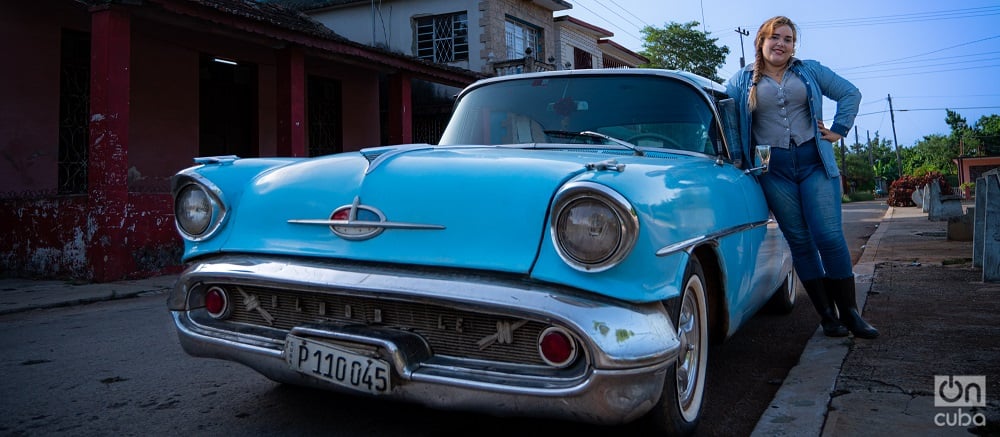
Omaris Valentina has been told no many times; especially in her province, in her municipality. But one day she arrived in Havana and there was someone who said yes. With that yes she goes through life between the green of her countryside and the blue of her car, thanking and remembering everyone who gave her a little push. She continues crying for her father, but she has Panchón as the perfect amulet to protect her and take her a long way. After each show or recording, she and her mother get in the car and go back to the farm. Valentina happily keeps her three promises and takes them wherever she goes.

